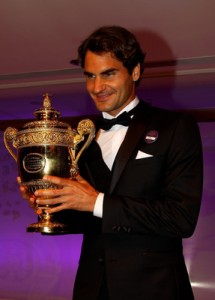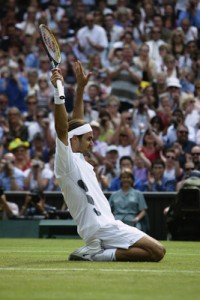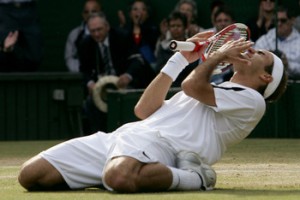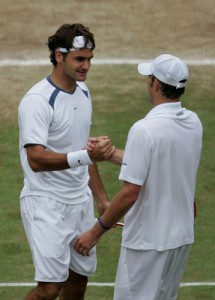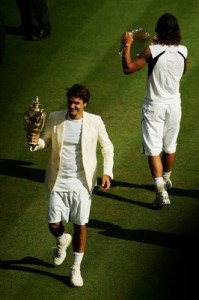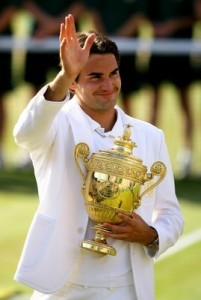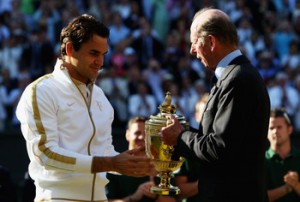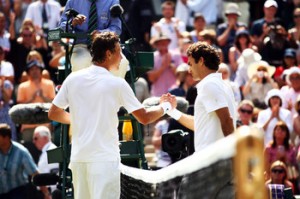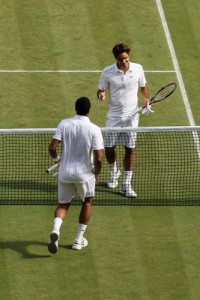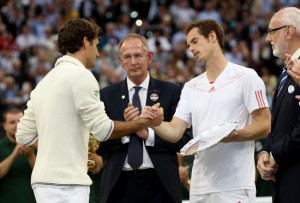Roger Federer Captures Historic 7th Wimbledon Championship
In a Wimbledon fortnight fraught with rain showers and major upsets, order was finally restored.
The Sunday resolution revived a familiar tradition on Centre Court.
After all, the man who had won the All-England Club championship for six of the last nine years managed to capture his seventh title on Sunday.
In the process Roger Federer defeated the great British hope—Andy Murray.
Once again, the roof had to be closed over Centre Court when rain interrupted play
This happened incessantly during week two.
At that particular point in the match each player had won one set. Momentum, however, seemed on Federer’s side since he had taken the second set.
Once play resumed, Federer ratcheted his game up a notch, denying Murray his moment in the sun.
Federer won his seventh Wimbledon crown in a place that felt like home.
The Swiss Maestro’s magic had returned, absent the past two years on Wimbledon’s Centre Court.
Lifting the trophy in 2012 seemed every bit as sweet as it did when he captured his first title in 2003.
2003: Roger Federer Wins His First Wimbledon Title
21-year-old Roger Federer defeated 6’4 Aussie Mark Philippousis 7-6, 6-2, 7-6 in the Wimbledon final in 2003.
This was Federer’s first Wimbledon Championship and his first ever Grand Slam title.
Finally the young Swiss fulfilled the promise that had eluded him all these years leading up to the Wimbledon final.
He shed his first tears on court––tears of joy at finally winning.
Federer climbed to No. 3 in the world with the win.
He was the seventh different man to win a major title in the last seven grand slam events.
Prior to this tournament, Federer had never made it past the quarterfinals of a major.
Roger Federer had arrived, showing the world that his play conjured some magic on Centre Court at Wimbledon.
2004: Roger Federer Wins His Second Wimbledon Trophy
In 2004 Roger Federer defeated American Andy Roddick in the final 4-6, 7-5, 7-6, 6-4.
Winning his 17th title overall, Federer captured his second consecutive Wimbledon Championship, his third grand slam win.
But it was not easy.
Federer had to quell his nerves in order to come back from a break down in the third.
By doing so, the Swiss sent the third set into a tiebreak.
Federer credited a rain delay for giving him an opportunity to regroup.
During the interruption, the Swiss decided to come into the net more often to shorten points and take Roddick out of his rhythm.
It worked. Federer forced the tiebreak and won the set and then the match.
The magic stayed alive another year.
2005: Roger Federer Wins Third Championships
Roger Federer again defeated American Andy Roddick in the finals of Wimbledon 6-2, 7-6, 6-4.
The world No. 1 played nearly flawless tennis throughout the match.
23-year-old Federer joined the ranks of Sampras and Borg by winning three championships in a row.
Roddick fought hard but failed to take a set from a firmly entrenched Federer.
A rain delay once more postponed play after the second set.
Roddick came back with more energy and determination, but Federer was not to be denied, closing out the match in three sets.
With each victory on Centre Court, Federer grew more comfortable on the grass.
The world No. 1 was making himself right at home on the lawns of the All-England Club.
2006: Federer Wins Fourth Wimbledon Title
In 2006 Roger Federer defeated Rafael Nadal 6-0, 7-6, 6-7, 6-3 in the Wimbledon finals.
The tennis world was surprised to see Nadal in the finals at Wimbledon because he was regarded as merely a clay court specialist.
There was no doubt of Nadal’s prowess on the clay, they thought. But he will never be able to win on grass—was the major opinion of the day.
Federer won in four sets but Nadal was more competitive at Wimbledon than Federer expected.
Federer’s victory gave him his fourth consecutive Wimbledon crown and his eighth grand slam victory.
But Nadal’s appearance in the final announced that the Majorcan was expanding his game and his expectations.
Nadal would no longer be satisfied to confine his playing power to the clay courts.
Soon the world No. 2 would become a force to be reckoned with on all surfaces.
Federer had reasons to be concerned.
2007: Federer Defeats Nadal for His Fifth Championship
Many changes were taking place at Wimbledon in 2007.
For the first time ever equal pay was awarded for both the gentlemen and the ladies.
The All-England Club had decided to put a roof over Centre Court to alleviate the many hours of lost competition because of rain.
For the time being, however, there was no roof on Centre Court.
But one thing that was not changing was the men’s champion Roger Federer who won his fifth consecutive championship.
He defeated Rafael Nadal, the No. 2 seed, 7-6, 4-6, 7-6, 2-6, 6-2 in three hours and 45 minutes, making it the third longest men’s final at that time.
With his victory, Federer tied Bjorn Borg for five consecutive wins at Wimbledon.
It proved to be an emotional moment for the Swiss as he equaled the legendary Swede.
But not everything was strawberries and cream for the Swiss because even though losing, Nadal was moving ever closer to matching Federer on the grass.
2008: Federer Suffers His First Loss at the All-England Club
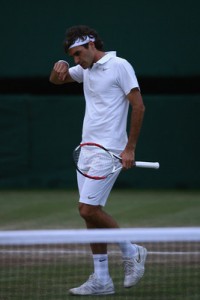
It was a dark day for Federer, losing his first final match on Centre Court in 2008 to Rafael Nadal.
In perhaps one of the greatest matches ever played, Rafael Nadal defeated Roger Federer on a day filled with rain, wild swings in momentum and finally with descending darkness.
The score was 6-4, 6-4, 6-7, 6-7, 9-7.
The match lasted four hours and 48 minutes.
It gave Nadal his fifth grand slam title.
It was, however, his first Wimbledon championship and the only major for Nadal outside the French Open.
It also made the Majorcan the first man since Borg to win the French Open followed by Wimbledon in the same year––a feat not equaled since 1980.
It marked Federer’s first defeat on the lawns of Centre Court since 2003.
It kept the Swiss from surpassing Borg’s mark of five consecutive Wimbledon championships.
The magic had failed Federer for the first time.
2009: Federer Regains the Championship
Crowds attending Wimbledon in 2009 saw the retractable roof was now operational.
The roof, however, was closed only once during the fortnight because of rain.
The only time artificial lights flooded the court allowed the match between Andy Murray and Stanislas Wawrinka to extend to its conclusion.
Roger Federer who had played in seven consecutive finals on Centre Court won his sixth title and his 15th grand slam trophy.
The Swiss met American Andy Roddick in another historic final––the longest men’s final in the history of the tournament with a fifth set that extended to 30 games.
Federer won 5-7, 7-6, 7-6, 3-6, 16-14 while former champions Pete Sampras, Bjorn Borg and Rod Laver looked on.
In total Federer and Roddick played 77 games.
Federer was only able to break the Roddick serve during the last game of the match.
The magic returned in 2009, giving Federer his sixth Wimbledon trophy.
2010: Roger Federer Falls in the Quarterfinals
2010 marked Federer’s first attempt to win his seventh Wimbledon title.
Since Federer won his first Wimbledon crown in 2003, he had lost one match on Centre Court—the 2008 final against Rafael Nadal.
But 2010 was not a good year for the Swiss, having lost his quarterfinal match at the 2010 French Open against Robin Soderling—the man he defeated to win his first and only French Open title in 2009.
But now it was time for Wimbledon, Federer’s home away from home.
The Swiss worked his way through the draw. In the quarterfinals Federer faced Czech Tomas Berdych.
This year, however, it was Berdych, the No. 12 seed, who found magic on Centre Court, defeating the defending champion, Federer 6-4, 3-6, 6-1, 6-4.
The defeat stunned Federer and the assembled crowd.
It was the first time since 2002 that Federer would not be standing on one side of the net on the final Sunday of Wimbledon.
Berdych went on to defeat Novak Djokovic in the semifinals, losing to Rafael Nadal in the finals.
2011: Roger Federer Could Not Stop the Frenchman
Once again Federer prepared himself for a run at his seventh Wimbledon title.
Once again the Swiss made his way through the draw into the quarterfinals at the All-England Club.
His opponent of the day was Jo-Wilfried Tsonga whose potential on the court had been highly touted but whose success on the lawns at Wimbledon had been underwhelming to date.
Federer won the first two sets and it looked as though the world No. 3 was on his way into another Wimbledon semifinal.
But Tsonga took the third set, then the fourth and finally the fifth.
Federer lost 3-6, 6-7, 6-4, 6-4, 6-4 as Tsonga broke the Federer serve in each of the three final sets.
Federer could not break Tsonga’s serve after the first two sets.
Tsonga was on fire. He blew Federer off the court with his serving and his ground-strokes and the Swiss was powerless to stop him.
Win No. 7 would have to wait for another year.
2012: Roger Federer Wins Historic Seventh Title
The third time—as they say—is the charm.
Federer finally secured his seventh title at the All-England Club during this third attempt.
Seven championships in the past ten years is a healthy record that not many can match.
By winning on Sunday, Federer equalled the record of American Pete Sampras who won his seventh Wimbledon title in 2000.
Federer’s opponent in the final on Sunday was Scot Andy Murray who had all of Great Britain pulling for him to win his first Wimbledon title—in fact, his first Grand Slam title.
And, Murray started out brilliantly, taking the first set 6-4. The fans in the crowd roared to life, believing it might actually happen.
Ultimately, however, it was Federer who finally danced on the green lawns again, his feet barely skimming the surface as he moved with grace and determination around the court.
It was Federer magic returned.
The Swiss took the final three sets 7-5, 6-3, 6-4 to win the match.
There was so much riding on the win for Federer.
On Monday, the Swiss will once again be ranked the No. 1 player in the world. He will have banked his seventeenth grand slam title.
Further, he will tie Pete Sampras with 286 weeks at No. 1.
Sampras held the record for most weeks at No. 1 while Federer waited in line— one step behind at 285 weeks.
Federer will pass Sampras and take a lead that will be very difficult to break.
We are left wondering if the Federer magic will still be with him for the Olympics and perhaps even Wimbledon 2013?
